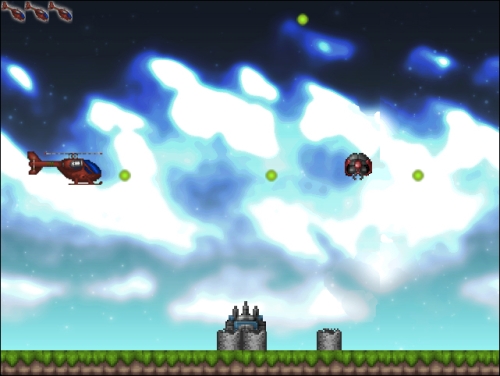The framework has come on in leaps and bounds and we are almost ready to make our first game. We are going to create a simple 2D sidescrolling shooter in the vein of the classic '80's and '90's shooter games such as R-Type or Pulstar. However, the game will not be set in space. Aliens have attacked earth and only you and your weaponized helicopter can stop them. One level of fast-paced action is available in the source code downloads and this chapter will cover the steps taken to create it. Here is a screenshot of the game we will be creating:

And another slightly more hectic shot:

There are still a few things that the framework must handle before we can create this game. These additions include:
- Sound
- Collision detection
By the end of the chapter you will have a good understanding of how this game was built using the framework and you will have the ability to continue and improve it. In this chapter, we will cover:
- Implementing sound
- Creating game-specific object classes
- Shooting and detecting bullets
- Creating different enemy types
- Developing a game
The SDL_mixer extension has its own Mercurial repository that can be used to grab the latest source for the extension. It is located at http://hg.libsdl.org/SDL_mixer. The TortoiseHg application can again be used to clone the extension's Mercurial repository. Follow these steps to build the library:
- Open up TortoiseHg and press CTRL+SHIFT+N to start cloning a new repository.
- Type http://hg.libsdl.org/SDL_mixer into the source box.
- The Destination will be
C:SDL2_mixer. - Hit Clone and wait for completion.
- Navigate to
C:SDL2_mixerVisualCand openSDL_mixer.vcprojin Visual Studio 2010. - As long as the x64 folder outlined in Chapter 2, Drawing in SDL was created, the project will convert with no issues.
- We are going to build the library without MP3 support as we are not going to need it, and also it does not work particularly well with SDL 2.0.
- Add
MP3_MUSIC_DISABLEDto the Preprocessor Definitions in the project properties, which can be found by navigating to C/C++ | Preprocessor, and build as per theSDL_imageinstructions in Chapter 2, Drawing in SDL.
The game created in this chapter will not need any advanced sound manipulation, meaning the SoundManager class is quite basic. The class has only been tested using the .ogg files for music and the .wav files for sound effects. Here is the header file:
enum sound_type
{
SOUND_MUSIC = 0,
SOUND_SFX = 1
};
class SoundManager
{
public:
static SoundManager* Instance()
{
if(s_pInstance == 0)
{
s_pInstance = newSoundManager();
return s_pInstance;
}
return s_pInstance;
}
bool load(std::string fileName, std::string id, sound_type type);
void playSound(std::string id, int loop);
void playMusic(std::string id, int loop);
private:
static SoundManager* s_pInstance;
std::map<std::string, Mix_Chunk*> m_sfxs;
std::map<std::string, Mix_Music*> m_music;
SoundManager();
~SoundManager();
SoundManager(const SoundManager&);
SoundManager &operator=(const SoundManager&);
};
typedef SoundManager TheSoundManager;The SoundManager class is a singleton; this makes sense because there should only be one place that the sounds are stored and it should be accessible from anywhere in the game. Before sound can be used, Mix_OpenAudio must be called to set up the audio for the game. Mix_OpenAudio takes the following parameters:
(int frequency, Uint16 format, int channels, int chunksize)
This is done in the SoundManager's constructor with values that will work well for most games.
SoundManager::SoundManager()
{
Mix_OpenAudio(22050, AUDIO_S16, 2, 4096);
}The SoundManager class stores sounds in two different std::map containers:
std::map<std::string, Mix_Chunk*> m_sfxs; std::map<std::string, Mix_Music*> m_music;
These maps store pointers to one of two different types used by SDL_mixer (Mix_Chunk* and Mix_Music*), keyed using strings. The Mix_Chunk* types are used for sound effects and the Mix_Music* types are of course used for music. When loading a music file or a sound effect into SoundManager, we pass in the type of sound we are loading as an enum called sound_type.
bool load(std::string fileName, std::string id, sound_type type);
This type is then used to decide which std::map to add the loaded sound to and also which load function to use from SDL_mixer. The load function is defined in SoundManager.cpp.
bool SoundManager::load(std::string fileName, std::string id, sound_type type)
{
if(type == SOUND_MUSIC)
{
Mix_Music* pMusic = Mix_LoadMUS(fileName.c_str());
if(pMusic == 0)
{
std::cout << "Could not load music: ERROR - "
<< Mix_GetError() << std::endl;
return false;
}
m_music[id] = pMusic;
return true;
}
else if(type == SOUND_SFX)
{
Mix_Chunk* pChunk = Mix_LoadWAV(fileName.c_str());
if(pChunk == 0)
{
std::cout << "Could not load SFX: ERROR - "
<< Mix_GetError() << std::endl;
return false;
}
m_sfxs[id] = pChunk;
return true;
}
return false;
}Once a sound has been loaded it can be played using the playSound or playMusic functions:
void playSound(std::string id, int loop); void playMusic(std::string id, int loop);
Both of these functions take the ID of the sound to be played and the amount of times that it is to be looped. Both functions are very similar.
void SoundManager::playMusic(std::string id, int loop)
{
Mix_PlayMusic(m_music[id], loop);
}
void SoundManager::playSound(std::string id, int loop)
{
Mix_PlayChannel(-1, m_sfxs[id], loop);
}One difference between Mix_PlayMusic and Mix_PlayChannel is that the latter takes an int as the first parameter; this is the channel that the sound is to be played on. A value of -1 (as seen in the preceding code) tells SDL_mixer to play the sound on any available channel.
Finally, when the
SoundManager class is destroyed, it will call Mix_CloseAudio:
SoundManager::~SoundManager()
{
Mix_CloseAudio();
}And that's it for the SoundManager class.
